 |
|
http://commons.wikimedia.org/wiki/File:Billardiera_scandens(cropped).jpg http://commons.wikimedia.org/wiki/User:Casliber |
 |
| http://commons.wikimedia.org/wiki/User:Casliber |
Translate this page:
Summary
Physical Characteristics

 Billardiera_scandens is an evergreen Climber growing to 3 m (9ft) by 3 m (9ft).
Billardiera_scandens is an evergreen Climber growing to 3 m (9ft) by 3 m (9ft).
See above for USDA hardiness. It is hardy to UK zone 8. It is in leaf all year. The species is hermaphrodite (has both male and female organs).
Suitable for: light (sandy) and medium (loamy) soils and prefers well-drained soil. Suitable pH: mildly acid soils. It can grow in semi-shade (light woodland) or no shade. It prefers moist soil.
UK Hardiness Map
US Hardiness Map
Synonyms
Plant Habitats
Edible Uses
Fruit - raw or cooked[105, 154]. Unripe fruits can be roasted[193]. A pleasant sub-acid flavour akin to dried apples[2, 144]. Tastes like kiwi fruits (Actinidia deliciosa)[193]. The fruits are up to 2.5cm long[193].
References More on Edible Uses
Medicinal Uses
Plants For A Future can not take any responsibility for any adverse effects from the use of plants. Always seek advice from a professional before using a plant medicinally.
None known
References More on Medicinal Uses
The Bookshop: Edible Plant Books
Our Latest books on Perennial Plants For Food Forests and Permaculture Gardens in paperback or digital formats.

Edible Tropical Plants
Food Forest Plants for Hotter Conditions: 250+ Plants For Tropical Food Forests & Permaculture Gardens.
More

Edible Temperate Plants
Plants for Your Food Forest: 500 Plants for Temperate Food Forests & Permaculture Gardens.
More

More Books
PFAF have eight books available in paperback and digital formats. Browse the shop for more information.
Shop Now
Other Uses
References More on Other Uses
Cultivation details
Requires a moist, well-drained, humus-rich, lime-free soil in sun or semi-shade with a cool root run[200]. This species usually requires greenhouse protection in Britain[1], but plants can succeed outdoors on a wall in mild areas of the country[166]. They tolerate temperatures down to at least -7°c[157] in Australian gardens but this cannot be translated directly to British gardens because of our cooler summers and longer, colder and wetter winters.
References Carbon Farming Information and Carbon Sequestration Information
Temperature Converter
Type a value in the Celsius field to convert the value to Fahrenheit:
Fahrenheit:
The PFAF Bookshop
Plants For A Future have a number of books available in paperback and digital form. Book titles include Edible Plants, Edible Perennials, Edible Trees,Edible Shrubs, Woodland Gardening, and Temperate Food Forest Plants. Our new book is Food Forest Plants For Hotter Conditions (Tropical and Sub-Tropical).
Shop Now
Plant Propagation
Seed - best sown in a warm greenhouse as soon as it is ripe. Only just cover the seed. Sow stored seed in early spring in a warm greenhouse. The germination of fresh seed is usually prolific, but stored seed can take a year to germinate[200]. When they are large enough to handle, prick the seedlings out into individual pots and grow them on in the greenhouse for at least their first winter. Plant them out into their permanent positions in late spring or early summer, after the last expected frosts. Cuttings of half-ripe wood, 10 - 12cm with a heel, July/August in a frame. Fair percentage. Layering.
Other Names
If available other names are mentioned here
Native Range
AUSTRALASIA: Australia (New South Wales, Queensland (southeast), Victoria, Australian Capital Territory)
Weed Potential
Right plant wrong place. We are currently updating this section.
Please note that a plant may be invasive in one area but may not in your area so it’s worth checking.
Conservation Status
IUCN Red List of Threatened Plants Status :

Growth: S = slow M = medium F = fast. Soil: L = light (sandy) M = medium H = heavy (clay). pH: A = acid N = neutral B = basic (alkaline). Shade: F = full shade S = semi-shade N = no shade. Moisture: D = dry M = Moist We = wet Wa = water.
Expert comment
Author
Sm.
Botanical References
154
Links / References
For a list of references used on this page please go here
Readers comment
| Add a comment |
|
If you have important information about this plant that may help other users please add a comment or link below. Only comments or links that are felt to be directly relevant to a plant will be included. If you think a comment/link or information contained on this page is inaccurate or misleading we would welcome your feedback at [email protected]. If you have questions about a plant please use the Forum on this website as we do not have the resources to answer questions ourselves.
* Please note: the comments by website users are not necessarily those held by PFAF and may give misleading or inaccurate information.
To leave a comment please Register or login here All comments need to be approved so will not appear immediately.
|
Subject : Billardiera_scandens
|
|
|
|